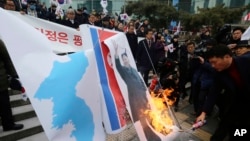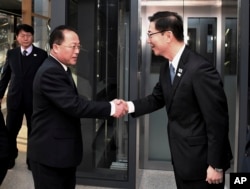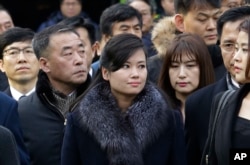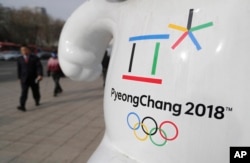Concessions being made to accommodate North Korea’s participation in the upcoming Olympics have reignited the debate in democratic and prosperous South Korea over the benefits of working towards unification with its impoverished, repressive and nuclear-armed neighbor.
South Korean President Moon Jae-in achieved at least a temporary pause in North Korean missile and nuclear tests by persuading the Kim Jong Un government to agree to send a large delegation to the PyeongChang Winter Olympics to be held in early February in South Korea.
Falling support
North Korea agreed to send an over 400-member delegation to the games that will include athletes, musicians, artists and a large cheering section. South Korea also agreed to pay all travel expenses for visitors coming from the North, in addition to the over $12 billion the South is already paying to host the games.
Moon’s Olympic outreach reopened lines of communications with Pyongyang, gained a promise for future mutual security talks, and reduced the potential for military conflict over the North’s repeated violations of United Nationals Security Council resolutions banning its nuclear weapons program.
But Moon’s approval rating has dropped to 66 percent this week in one public opinion poll, down from 73 percent the week before, in part over his conciliatory sports diplomacy efforts with North Korea.
Accommodations made to facilitate the participation of North Korea by fielding a joint woman's ice hockey team, and marching together in the opening ceremony of the Olympics under a “unification flag” have been met with public anger.
Volunteer debate
A Pyeongchang press conference over the weekend featuring three South Korean Olympic volunteers turned into a debate that reflects the growing concerns among many in South Korea over efforts to accommodate the nuclear-armed North. An increasing number of young people in South also oppose the longstanding national goal of peaceful unification of the two Koreas that would likely require substantial economic assistance.
When the discussion turned from the North’s inclusion in the Olympics to the prospect of Korean unification, Lee Ji-seol, a 22-year-old woman from the Pyeongchang region, said such an outcome would be positive.
“I support (unification). I think there is a reason why the world is paying attention to the South and North Korea playing together. In my own opinion, I also think if the South and the North unifies, it will bring more synergy and create a more stronger Republic of Korea,” said Lee.
Park Min-cheol, who recently served in the South Korean military, voiced opposition to unification. He and many of his peers are critical of the Seoul government’s concessions to pacify Pyongyang, and worry that unification would impose a costly burden on his generation.
“I am not sure that it is because many of my friends also served in the military. They think it is highly possible that we will need to financially help North Korea, and it will not be good for South Korea,” said Park.
But Choi Sang-hwan, a 72-year-old Olympic volunteer, took issue with the younger generation’s objection to the possible financial burden of unification versus the alternative, the looming threat of war.
“When I was serving the military, I participated in the Vietnam War. So I know the tragedy of war very well. War takes everything away. There is no guarantee that there will not be a war under the status of division. So I think unification must be realized so that the next generation can live free from anxiety.” Said Choi.
Women’s hockey
Young South Koreans in particular have also voiced opposition to the government interference in a sporting competition by forcing the country’s hockey team to include players from the North.
The International Olympic Committee (IOC) on Saturday agreed to allow the South to add 12 North Korean players to the women’s hockey team. The hockey team coach, Sarah Murray, who earlier said a joint squad could undermine team chemistry, agreed on Monday to make the best of the situation.
"It's a tough situation to have our team be used for political reasons, but it's kind of something that's bigger than ourselves right now,” said Murray.
“Pyongyang Olympics”
Many South Koreans also resent that North Korea’s participation in the Olympics has become the overriding focus of the international media.
On Monday, when a North Korean delegation arrived at the Seoul train station to visit potential venues for cultural performances, they were met by groups of South Korean demonstrators. One sign at the protest read: "We're opposed to Kim Jong Un's Pyongyang Olympics!” referring to the North Korean capital rather than the South Korean town of Pyeongchang that will host the games.
Moon’s conservative opponents are also critical of his Olympic embrace of the North. Hong Joon-pyo, the leader of the conservative Liberty Korea Party, said the Moon administration “is being dragged around by Kim Jong Un’s peace offensive” that is aimed at weakening international sanctions imposed for its continued nuclear weapons development.
Youmi Kim in Seoul contributed to this report.










